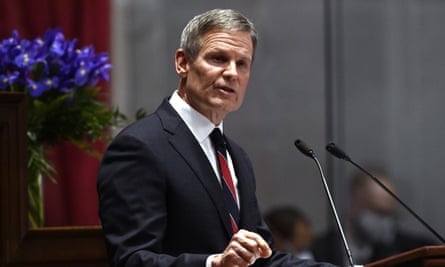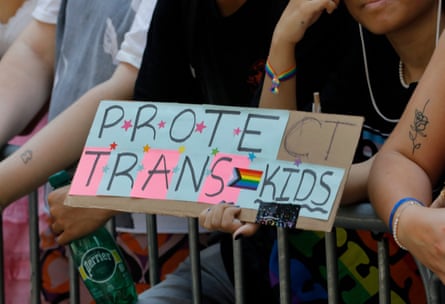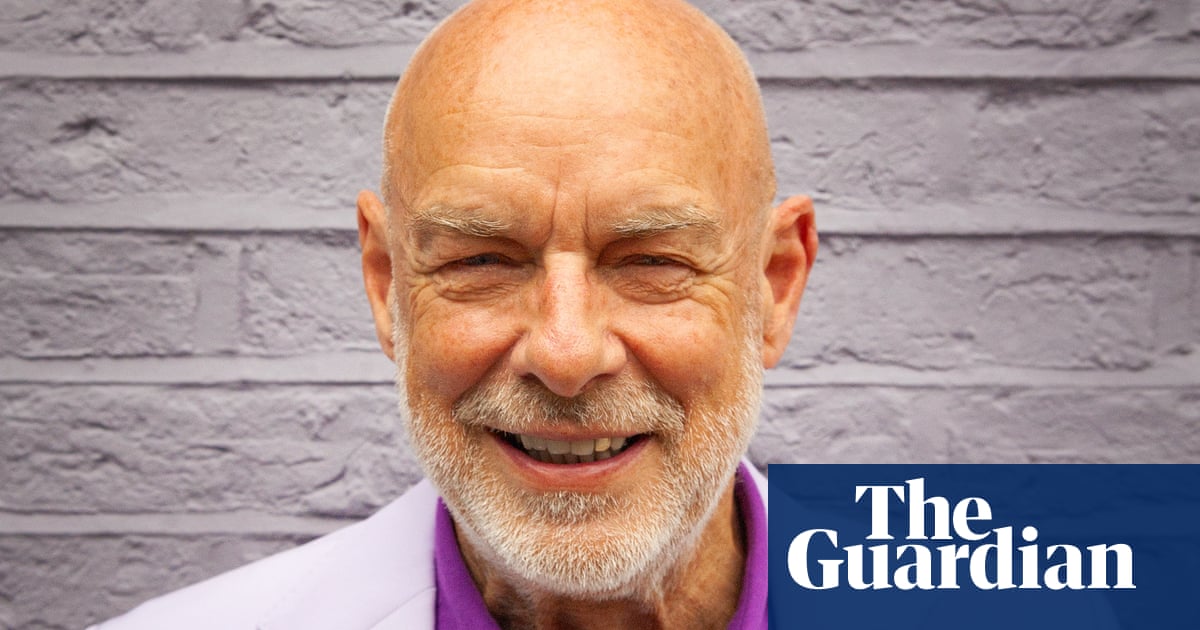The doctors have been dismissed by judges across the US as “conspiratorial”, “deeply biased”, “far off” and deserving “very little weight”.
But their testimonies were nonetheless submitted by the state of Tennessee in defense of an anti-trans law the US supreme court will consider in December, in one of the most important cases of the court’s session and among the most consequential LGBTQ+ rights cases in its history.
In US v Skrmetti, the court will weigh whether transgender youth have a constitutional right to access healthcare treatments endorsed by every major medical association in the country, who say the care improves patients’ mental health and reduces the suicide risks of vulnerable teens. The case originated with three trans youth and their parents who sued Tennessee last year over its ban on gender-affirming healthcare for minors, arguing the care was medically necessary and “life-saving”. The outcome could have profound implications for trans rights, bodily autonomy and the government’s authority over people’s private healthcare decisions.
If the court’s conservative supermajority upholds Tennessee’s ban, it would, in effect, be siding with doctors who, LGBTQ+ advocates and trans healthcare experts say, have repeatedly peddled misinformation and in some cases, espoused religious doctrine in the name of science. Six doctors who filed expert declarations for Tennessee have a history of advocating against trans healthcare, and five of them have previously been rebuked or discounted by judges due to their backgrounds.
Four of those doctors cited by the Tennessee attorney general, Jonathan Skrmetti, to defend the ban have been linked to a rightwing Christian legal group and have profited from their continued testimony on gender-affirming care, and three of them have never provided trans youth healthcare, according to research from Accountable.US, a progressive watchdog organization, which shared its findings with the Guardian.
“The supreme court case rests on what can only be described as junk science – unscientific, biased testimony from a small group of doctors who stand far outside of the medical mainstream,” said Caroline Ciccone, Accountable.US’s president and former deputy assistant secretary in the US Department of Health and Human Services. “These so-called experts’ testimony have been discredited by courts already. It’s very telling that they can’t come up with anything better.”
Tennessee is one of 24 states that have restricted trans youth care by banning puberty blockers and hormone therapy, though two laws are currently blocked by courts. Those treatments are part of the standards of care backed by mainstream medical and mental health groups in the US, including the American Medical Association, the American Academy of Pediatrics and the American Psychiatric Association. The University of California, Los Angeles’s Williams Institute says those bans have impacted more than 100,000 trans youth, forcing families to either travel out of state for care or lose access. A recent study found suicide rates among trans youth increased in states that passed anti-trans laws.
‘I intentionally do not treat transgender patients’
Tennessee’s lawyers have argued that “radical gender ideology has captured an entire alphabet of American medical organizations” and that legislators have a right to dictate opposing policy. The courts, the state argued, should disregard the “‘mainstream’ American medical community” and consider Tennessee’s own set of experts.
One of those experts is Dr Paul Hruz, a pediatric endocrinologist who testified in a 2017 deposition: “I intentionally do not treat transgender patients.” He argued in his Tennessee declaration that the medical interventions long recommended by US medical groups were “experimental” and “unethical”. In 2023, an Arkansas federal judge noted that Hruz had been recruited by the Alliance Defending Freedom (ADF), the rightwing Christian legal advocacy group that has been a key player in anti-trans and anti-abortion cases. The judge said Hruz and other ADF-backed experts were “testifying more from a religious doctrinal standpoint rather than that required of experts”.

A North Carolina judge accused Hruz of “conspiratorial intimations” and “political hyperbole”, saying he was “not qualified” to opine on gender dysphoria or mental health, but could testify as an endocrinologist about hormone treatment risks. A Florida judge said he was a “deeply biased advocate”.
In 2013, Hruz, who is based in Missouri, met with Kim Hutton, who has a trans son and spoke with him about the suicide risks for trans kids denied care. According to Hutton’s later deposition, Hruz responded: “Some children are born in this world to suffer and die.”
“He’s a fanatic, not an expert,” Hutton said in a recent interview. “That’s not someone who cares deeply for children. He would have parents like me strip medical care from our children and watch them suffer.”
Hruz said in an email that Hutton’s recollection of their meeting “is not reliable” and her “underlying biases should be evident” from her role founding a support group for families of trans youth. “I do not hold, nor have I ever held a view that ‘some children are born to suffer and die,’” he said.
Hruz said he does care for patients with gender dysphoria for “endocrine related diseases”, but doesn’t support administering puberty blockers and hormone therapy for dysphoria “outside of a carefully designed and properly controlled experimental trial”. He said his position aligns with several European countries (although none have categorically banned this care, as Tennessee has), adding: “The claim that one must engage in a questionable medical practice to be able to assess the reliability of scientific evidence for the practice is demonstrably false … To my knowledge, the judges are not trained scientists.”
‘Deficiency in their experience’
Another expert cited by Tennessee is Dr James Cantor, a sexual behavior scientist who specializes in studying pedophilia. He argued in his declaration that research finding gender-affirming care improves youth mental health should be discounted, because “correlation does not imply causation”.
In a 2022 Alabama case, a Donald Trump-appointed judge noted that Cantor had never diagnosed or treated youth gender dysphoria, had no experience monitoring patients receiving gender-affirming medications and had no knowledge of treatment methodologies used in the state’s clinics. The judge thus gave his testimony “very little weight”.
During a deposition in West Virginia, Cantor could not name any puberty-blocking drug, HuffPost reported. In a CBC interview, he said he had more than doubled his income by testifying in these cases.
Cantor said in an email that the ADF had retained him for three out of roughly 50 cases in which he has provided testimony and that he is a “gay Jewish atheist Canadian citizen … very far from being part of any Christian conservative movement”. He said his expertise was in “research methodology explaining how to distinguish reliable from unreliable studies” and that he had “concluded the evidence of mental health benefits from medicalized transition to be insufficient relative to its harms, given the mental health treatment alternatives available and the extent of remaining unknowns and uncertainties”.

A Tennessee federal judge who initially blocked the healthcare ban said both Cantor and Hruz were “minimally persuasive” given the “deficiency in their experience”.
“It’s such a strange thing to watch,” said Sydney Duncan, senior counsel at Advocates for Trans Equality, who is based in Alabama. “It’s as if the American Cancer Society recommended a certain standard of care for someone getting chemotherapy, but then a random doctor in a strip mall next to a Domino’s Pizza with no cancer experience or research had a differing opinion, and we’re expected to take him seriously.”
‘Far off from the accepted view’
Dr Michael Laidlaw, another endocrinologist cited by Tennessee, testified in a 2022 case that he had no experience treating gender dysphoria or conducting research related to trans identity. Laidlaw, who has been represented by ADF, previously compared gender-affirming care with Nazi eugenics, according to the Argus Leader, a South Dakota newspaper. A judge questioned Florida’s decision to use him as a witness, criticizing his refusal to use trans people’s correct pronouns and characterizing him as “far off from the accepted view”. Laidlaw declined to comment.
Two doctors submitted by Tennessee who have treated trans youth have also faced scrutiny in the courtroom. Dr Geeta Nangia, a South Carolina physiatrist, said in a Florida case that she had treated “over a thousand patients with gender dysphoria”, but a judge rebuked her for not clarifying “how many of those patients, if any, she supported in their identified gender”. A plaintiff’s expert said the number was “highly suspect”. The judge denied Florida’s request to have Nangia do mental examinations on two 12-year-old trans plaintiffs, saying her views and résumé were unclear and that “no individual will be required to submit to an examination by a transgender denier or skeptic”. Nangia declined to comment.
Dr Stephen Levine, a psychiatrist who has also been hired by ADF, was cited by Tennessee despite a California judge previously saying his testimony in 2015 deserved “very little weight” because he “misrepresents standards of care” and had referenced a “fabricated anecdote” about gender-affirming care in a California prison. In a phone conversation with the Guardian, Levine denied fabricating the story, saying he was relaying an anecdote shared with him by state officials and that the standards of care at issue – relating to care in prisons – “were not trustworthy at all”.
In a Florida case, a judge said Levine was the only state expert with significant trans healthcare experience and noted that the psychiatrist acknowledged that he believed hormones and puberty blockers were “sometimes appropriate”.
Levine, who has advocated for psychotherapy to treat gender dysphoria, said he had testified in roughly 40 cases since 2019 related to LGBTQ+ issues and that he was not a “rightwing Christian advocate”: “I’ve been characterized as the No 1 enemy of trans people in the courtroom. I see that as an ironic thing, that I’m the enemy of the people I’ve been trying to help for 50 years.”
The ADF senior counsel John Bursch said in a statement: “States like Tennessee are upholding their duty to protect children,” adding, “Many European countries that once pushed for gender transition efforts are all reversing course and it is time the US catches up.” But as international advocates noted in a supreme court brief, countries that anti-trans advocates often cite as models for tightening access to healthcare for trans youth – including Sweden, Finland and the UK – have not eliminated access to this care in the way Tennessee has.

Physicians have an obligation to follow guidelines and best practices established by legitimate medical groups – and not deny proven treatments based on politics, said Dr Molly McClain, medical director of a New Mexico clinic for trans youth: “The evidence is very strong that this care is life-saving and health-promoting.”
In eight years of serving trans youth, she said she has seen firsthand, as data has shown, how access to blockers can reduce suicidality and improve the course of a young person’s life: “Why would you take something away from a kid that you know could help them not want to kill themselves?”
‘Much happier because of this care’
US v Skrmetti will be argued on 4 December. The complaint was originally brought by ACLU, Lambda Legal and the law firm Akin, and the Biden administration later intervened to join the case, arguing the healthcare ban was unconstitutional.
Experts expect that under Donald Trump, who campaigned on anti-trans misinformation, the Department of Justice could withdraw from the case, but there could still be a ruling next year with the civil rights groups remaining as parties.
The lawyers argue the bans are discriminatory as they prohibit treatments for trans youth, but allow the same medications for cisgender youth (cisgender boys with delayed puberty, for example, can be given testosterone, but trans boys cannot). Families of trans youth living in states with bans have filed briefs laying out the agonizing choices they’ve had to make to preserve their care.
Tennessee has repeatedly linked the case to the dismantling of abortion rights, arguing the Dobbs ruling overturning Roe v Wade established that “states retain broad authority to regulate medical treatments, including the prohibition of treatments that apply only to patients of one sex”.
“This case is about more than just transgender adolescents,” said Harper Seldin, an ACLU senior staff attorney. “This is about the relationship between states and the people who live in them and decision-making about truly critical medical care and who determines what kind of life we lead for ourselves and for folks’ children.”
Hutton, the parent of a trans son, said it was hard to process the threat posed by the case. “Is the highest court in our country going to agree that children like mine can’t exist, don’t exist and do not deserve medical care that has been proven to help them lead successful lives and thrive in this world?”
Chelsea Freels, a 19-year-old trans woman impacted by Missouri’s gender-affirming healthcare ban, said she was watching the supreme court case with anxiety.

“Doctors take a hippocratic oath to do no harm. And the more you hear about trans healthcare from trans people, the more you realize that taking away this healthcare is doing harm,” she said.
The benefits of this care are obvious, added Freels, a political science student: “I transitioned as the political climate got worse and worse around me. I could see the storm clouds getting darker and darker. But even then, I’m much happier now than I was before I transitioned.”

.png) 1 month ago
7
1 month ago
7













































